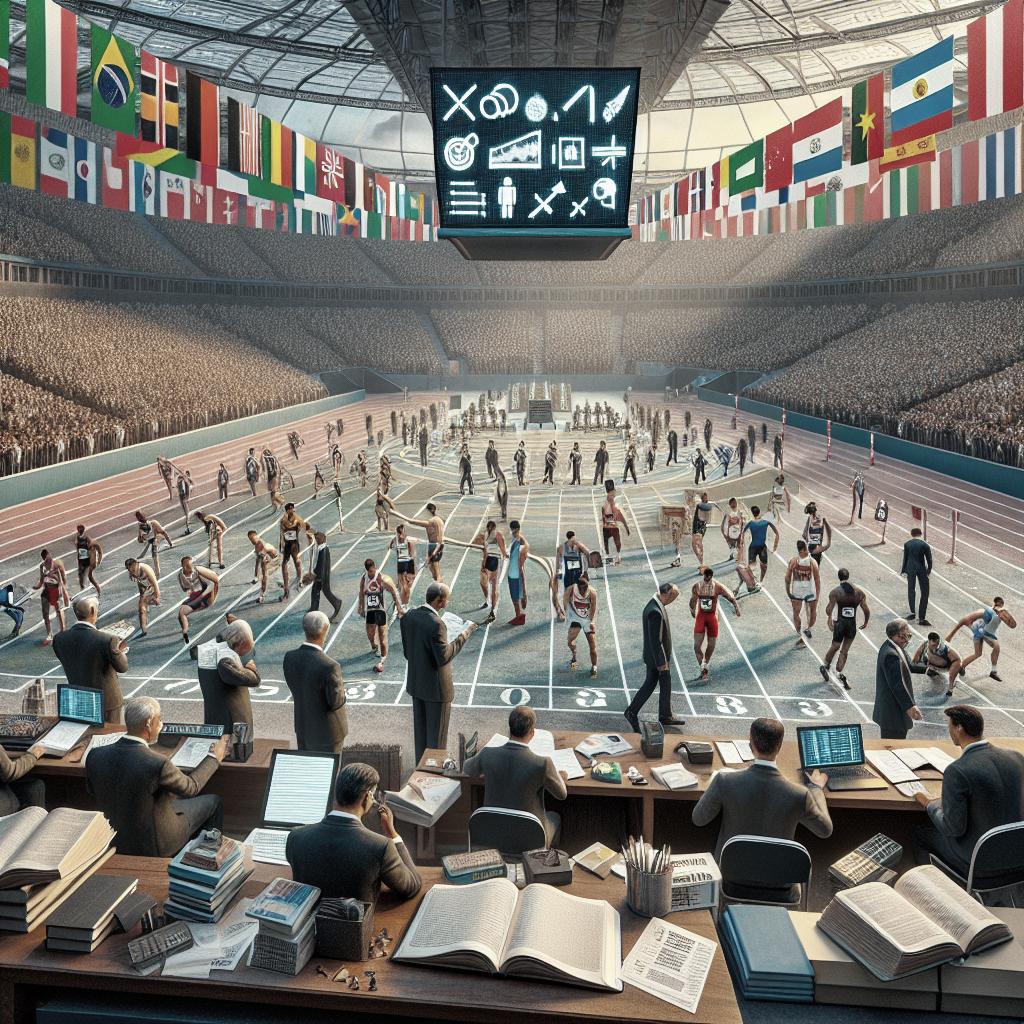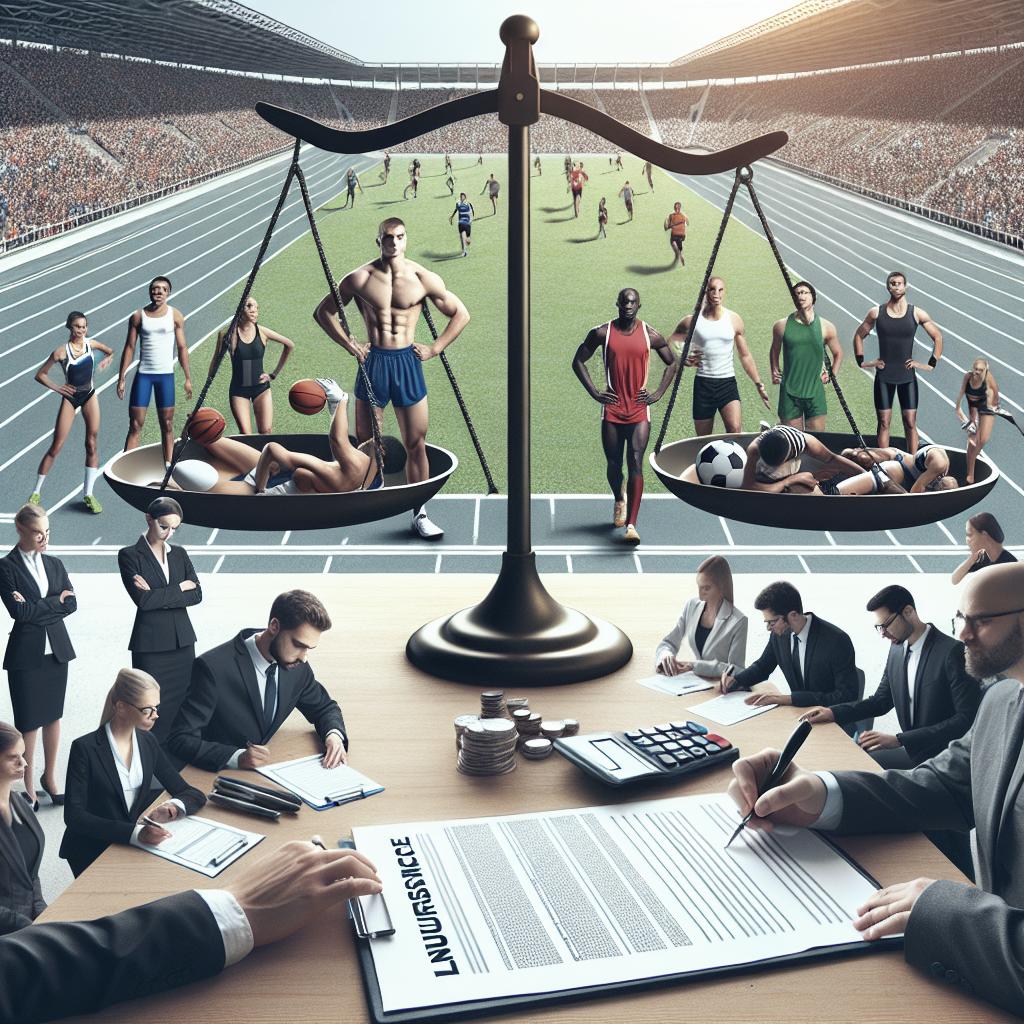< lang="en">
Introduction
Organizing international sports events requires meticulous regulation compliance across multiple domains, ranging from governance and anti-doping measures to human rights and anti-discrimination laws. This comprehensive guide delves into the various facets that govern international sports events, providing insights into the critical roles played by key organizations and treaties. Whether it’s the Olympic Games or other global sports gatherings, understanding regulation compliance is essential for the integrity and success of these events.
Scope of Guide
This guide offers a detailed examination of the regulatory framework surrounding international sports events. We will cover governance structures specific to individual sports and the Olympic Games, focus on anti-doping compliance measures, and explore human rights provisions. Additionally, the guide provides resources for further research, including relevant think tanks, bibliographies, and databases. By the end of this comprehensive overview, readers will have a clear understanding of the complexities involved in ensuring regulation compliance in international sports.
List of Key Abbreviations
Some frequently used abbreviations in the realm of international sports regulation include:
- IOC – International Olympic Committee
- IFs – International Federations
- NOCs – National Olympic Committees
- OCOGs – Organising Committees of the Olympic Games
- CAS – Court of Arbitration for Sport
- WADA – World Anti-Doping Agency
- NADAs – National Anti-Doping Agencies
Table of Contents
- Governance of Individual Sports
- Olympic Games
- Olympic Charter
- International Olympic Committee (IOC)
- International Federations (IFs)
- National Olympic Committees (NOCs)
- Organising Committees of the Olympic Games (OCOGs)
- Court of Arbitration for Sport (CAS)
- Overview
- Arbitral Awards
- Anti-Doping
- World Anti-Doping Agency
- National Anti-Doping Agencies
- Anti-Doping Treaties and Declarations
- Human Rights & Anti-Discrimination Provisions in International Treaties & Declarations
- Additional Themes & Web Resources
- Women & Sports
- EU Sports & the Constitution
- EU Sports & Violence
- Think Tanks, Associations & Research Sites
- Sports Bibliographies, Databases and Periodicals
- References
Governance of Individual Sports
Each sport has its own governing body that is responsible for maintaining the rules and regulations, organizing events, and ensuring fair play. For instance, FIFA governs football, the International Rugby Board oversees rugby, and the International Tennis Federation manages tennis. These organizations set the standards and guidelines for their respective sports, including rules on player eligibility, anti-doping measures, and the organization of international competitions.
Besides creating and enforcing rules, governing bodies also play a significant role in the promotion of their sports. They develop youth programs, provide training and resources for coaches and officials, and work to expand their sport’s global reach. Compliance with international standards is crucial for these organizations to maintain the integrity of their sport and ensure it can compete on the world stage.
Olympic Games
The Olympic Games, held every four years, are the pinnacle of international sports competitions. These events bring together athletes from around the world to compete in various sports, united under the Olympic Charter. The preparation and execution of the Olympic Games require adherence to stringent regulations and guidelines imposed by the IOC to ensure fair competition and uphold the values of the Olympic Movement.
The Olympics are more than just a sports event; they are a celebration of peace, unity, and sportsmanship. Compliance with international laws and regulations ensures that the Games are conducted with integrity and respect for all participants. The success of the Olympics hinges on collaboration among various organizations, including the IOC, IFs, NOCs, and OCOGs, each with specific roles and responsibilities.
Olympic Charter
The Olympic Charter is the codified structure and rules of the Olympic Movement. It enshrines the fundamental principles of Olympism, establishes the rights and obligations of the various stakeholders, and governs the organization and operation of the Olympic Games. The Charter serves as both a legal document and a philosophical guide, ensuring that the spirit and values of the Olympic Movement are preserved.
Essential components of the Olympic Charter include guidelines on the selection of host cities, the role of the IOC, IFs, and NOCs, and rules on anti-doping and fair play. It is through compliance with these guidelines that the Olympic Games maintain their reputation and institutional integrity. The Charter is periodically reviewed and updated to reflect the evolving landscape of international sports.
International Olympic Committee (IOC)
The International Olympic Committee is the supreme authority of the Olympic Movement. It is responsible for overseeing the organization and coordination of the Olympic Games and upholding the values enshrined in the Olympic Charter. Composed of members from around the world, the IOC works to promote Olympism and the unifying power of sports.
One of the key roles of the IOC is the selection of host cities for the Olympic Games. This process involves a thorough evaluation of candidate cities’ capabilities to meet the stringent requirements for hosting such a prestigious event. The IOC also collaborates with IFs and NOCs to ensure compliance with international regulations and to foster development and inclusivity in sports.
International Federations (IFs)
International Federations are non-governmental organizations recognized by the IOC as administering sports at the world level. Each IF governs its respective sport and is responsible for ensuring that competitions are held according to the prescribed rules and standards. IFs play a crucial role in promoting and developing their sports globally.
Compliance with IF regulations is mandatory for participation in international competitions, including the Olympic Games. IFs also work closely with the IOC to ensure that their sports adhere to the values and principles of Olympism. They provide guidance on technical aspects, athlete eligibility, and anti-doping measures, ensuring a level playing field for all competitors.
National Olympic Committees (NOCs)
National Olympic Committees represent the IOC in each country and are responsible for organizing their nation’s participation in the Olympic Games. NOCs work to promote Olympic values at the national level, support athlete development, and ensure compliance with the rules and regulations set by the IOC and IFs.
NOCs also play a vital role in education and outreach, aiming to inspire and engage future generations with the principles of Olympism. They collaborate with national sports federations to prepare athletes for international competition and provide logistical and financial support to ensure successful representation at the Olympic Games.
Organising Committees of the Olympic Games (OCOGs)
Organising Committees of the Olympic Games are established specifically for each edition of the Games and are responsible for the planning, preparation, and execution of the event. OCOGs work under the guidance of the IOC and must comply with the Olympic Charter and various international regulations.
From infrastructure development to coordinating with local and national government bodies, OCOGs oversee every aspect of the Games. Their responsibilities extend to ensuring athlete accommodations, venue readiness, transportation, security, and overall event logistics. Effective collaboration and strict compliance with guidelines are crucial for the successful delivery of the Olympic Games.
Court of Arbitration for Sport (CAS)
Overview
The Court of Arbitration for Sport, established in 1984, is an independent institution that handles disputes related to sports. CAS plays a pivotal role in resolving issues ranging from athlete eligibility to breaches of anti-doping rules. Its decisions are binding and enforceable, providing a fair mechanism for resolving disputes within the sports community.
CAS operates under the International Council of Arbitration for Sport (ICAS) and is headquartered in Lausanne, Switzerland. The court is composed of arbitrators with expertise in sports law, and its procedures are designed to be accessible, efficient, and impartial. CAS ensures that the rights of all parties are protected and that justice is served in the realm of sports.
Arbitral Awards
Arbitral awards issued by CAS are final and binding, and they can be enforced internationally under the New York Convention on the Recognition and Enforcement of Foreign Arbitral Awards. CAS awards are recognized for their fairness and adherence to legal standards, providing a crucial mechanism for resolving sports disputes swiftly and effectively.
CAS decisions cover a wide range of issues, including contract disputes, disciplinary actions, and breaches of marketing agreements. The court’s role in upholding anti-doping rules is particularly significant, as it ensures that sports competitions remain fair and free from performance-enhancing substances.
Anti-Doping
World Anti-Doping Agency
The World Anti-Doping Agency (WADA) was established in 1999 to promote, coordinate, and monitor the fight against doping in sports. WADA is responsible for creating the World Anti-Doping Code, which sets out the regulations and standards for anti-doping practices worldwide. The agency works in collaboration with various stakeholders, including international sports federations, national anti-doping agencies, and governments.
WADA conducts research, provides education and outreach programs, and ensures that anti-doping policies are implemented consistently across all sports and countries. Compliance with WADA standards is mandatory for participation in international competitions, and the agency’s efforts play a crucial role in maintaining the integrity of sports.
National Anti-Doping Agencies
National Anti-Doping Agencies (NADAs) are responsible for implementing and enforcing anti-doping policies at the national level. They conduct testing, manage results, and provide education and preventive programs to athletes and sports organizations. NADAs work closely with WADA to ensure that anti-doping measures are consistent with international standards.
NADAs play a crucial role in building a culture of clean sports within their respective countries. They collaborate with national sports federations, government bodies, and educational institutions to promote fair play and protect the health of athletes. By ensuring compliance with anti-doping regulations, NADAs contribute to the global fight against doping in sports.
Anti-Doping Treaties and Declarations
Various international treaties and declarations have been established to combat doping in sports. The UNESCO International Convention against Doping in Sport, adopted in 2005, is a notable example. This Convention aims to harmonize anti-doping policies worldwide and promote international cooperation in the fight against doping.
Compliance with these treaties and declarations is essential for the integrity of international sports events. They provide a legal framework for anti-doping measures, establish the responsibilities of governments and sports organizations, and promote a unified approach to addressing doping in sports.
Human Rights & Anti-Discrimination Provisions in International Treaties & Declarations
International sports events are governed by various human rights and anti-discrimination provisions enshrined in international treaties and declarations. These provisions ensure that all athletes, regardless of their race, gender, religion, or nationality, have the right to participate in sports without discrimination.
Treaties such as the Universal Declaration of Human Rights and the International Covenant on Civil and Political Rights provide the legal basis for protecting the human rights of athletes. Compliance with these provisions is crucial for promoting equality and inclusivity in sports, and for ensuring that international sports events are conducted in a manner that respects the dignity and rights of all participants.
Additional Themes & Web Resources
For further research and information on regulation compliance for international sports events, various web resources and databases are available. Organizations such as WADA, the IOC, and CAS provide valuable insights and updates on their official websites. Additionally, academic journals and publications on sports law and governance offer in-depth analyses of regulatory issues.
These resources enable stakeholders, including sports organizations, athletes, and policy-makers, to stay informed about the latest developments in sports regulation. Access to reliable information and research is essential for ensuring compliance and promoting transparency and integrity in international sports events.
Women & Sports
Promoting gender equality in sports is a crucial aspect of regulation compliance for international sports events. Various initiatives and policies have been established to ensure that women have equal opportunities to participate and compete in sports. The IOC, IFs, and NOCs are committed to promoting gender equity and empowering women through sports.
Compliance with gender equality provisions includes providing equal access to training, resources, and competition opportunities for women athletes. It also involves addressing and preventing gender-based discrimination and harassment within sports organizations. Promoting women’s participation in sports strengthens the values of inclusivity and diversity, aligning with the broader goals of the Olympic Movement.
EU Sports & the Constitution
The European Union has a significant influence on sports regulation compliance within its member states. The EU’s legal framework includes provisions that impact various aspects of sports, such as competition law, labor law, and the free movement of athletes. Compliance with EU regulations is essential for sports organizations operating within Europe.
The EU also promotes the role of sports in society, supporting initiatives that enhance social inclusion, physical health, and youth development. European sports organizations must navigate the complexities of EU law while ensuring compliance with international sports regulations. Collaboration between national sports federations and the EU is crucial for fostering a cohesive and inclusive sports environment.
EU Sports & Violence
Addressing violence in sports is a critical aspect of regulation compliance within the European Union. The EU has implemented various measures to combat violence, including legislative initiatives, awareness campaigns, and collaboration with sports organizations. These efforts aim to create a safe and respectful environment for athletes, officials, and spectators.
Compliance with anti-violence regulations includes implementing strict codes of conduct, providing training on conflict resolution, and taking swift disciplinary action against perpetrators of violence. Ensuring a violence-free sports environment is essential for the integrity of sports and the well-being of all participants. The EU’s commitment to preventing violence in sports contributes to a culture of respect and fair play.
Think Tanks, Associations & Research Sites
Various think tanks, associations, and research sites provide valuable insights and resources on regulation compliance for international sports events. Organizations such as the European Association for Sport Management (EASM), the International Sport and Culture Association (ISCA), and the Sports Law & Policy Centre (SLPC) contribute to the development and implementation of effective regulatory frameworks.
These entities conduct research, organize conferences, and publish reports on critical issues related to sports regulation. They provide a platform for stakeholders to discuss and address challenges, share best practices, and develop innovative solutions for ensuring compliance with international sports regulations.
Sports Bibliographies, Databases and Periodicals
Access to comprehensive bibliographies, databases, and periodicals is essential for staying informed about regulation compliance in international sports. Resources such as the International Bibliography of Sport and Exercise Sciences (IBSES), the SportDiscus database, and journals like the International Sports Law Journal (ISLJ) offer a wealth of information on various aspects of sports regulation.
These resources provide access to academic research, policy analyses, case studies, and legal opinions. They enable sports professionals, researchers, and policy-makers to stay updated on the latest developments and trends in sports regulation compliance, contributing to the continuous improvement of the regulatory framework governing international sports events.
References
References for this blog post include official websites of the International Olympic Committee (IOC), World Anti-Doping Agency (WADA), Court of Arbitration for Sport (CAS), and various academic publications on sports law and governance. For more in-depth information, you can consult the following sources:
- International Olympic Committee (IOC) – www.olympic.org
- World Anti-Doping Agency (WADA) – www.wada-ama.org
- Court of Arbitration for Sport (CAS) – www.tas-cas.org
- International Sports Law Journal (ISLJ) – www.springer.com/journal/40318
Final Thoughts
| Section | Content Summary |
|---|---|
| Introduction | A brief overview of the importance and complexity of regulation compliance in international sports events. |
| Governance of Individual Sports | Discussion on how each sport has its governing body responsible for rules, organization, and promotion. |


